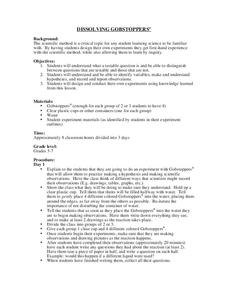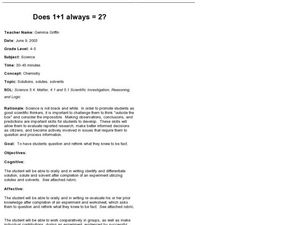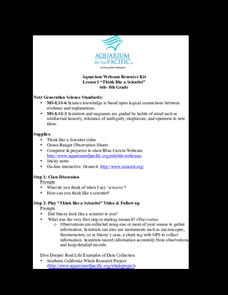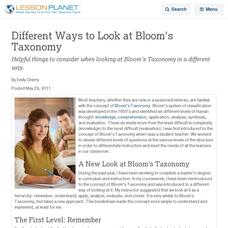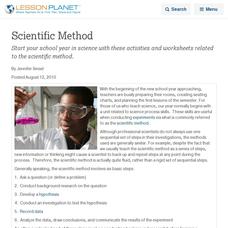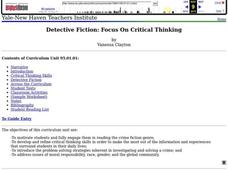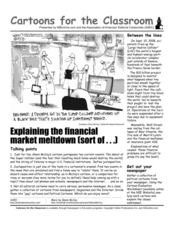Curated OER
Crazy for Cubes: Art and Science
Learners discuss Sol LeWitt and conceptual art, then analyze the differences in expressing a concept through model-based inquiry and aesthetic art criticism. They develop a geometric, scientific, or mathematical concept, then create an...
Curated OER
Dissolving Gobstoppers
Students design their own experiments . They study the scientific method and determine what a testable question is. They distinguish between questions that are testable and those that are not. They identify variables, make and understand...
Curated OER
Does 1 + 1 always = 2
What a great way to explore the scientific process! Learners conduct an experiment in which they use sugar and water to illustrate the concept of solutes and solvents. With this hands on approach, they are bound to remember what they...
The Science Spot
Independent Investigation Guidelines
A neatly formatted outline of the steps of the scientific method can be used as a reference sheet for your future science fair participants. For each step, you will find a few guiding questions or points to remember when working on them.
Curated OER
Absorbancy: What does it mean?
Define the scientific concept of absorbency as it relates to the properties of matter, then conduct an investigation. Learners answer several questions, then investigate the absorbency of several different types of towels. Tip: This...
Curated OER
Harry Potter and the Prisoner of Azkaban: Bloom's Taxonomy
Take a moment in your Harry Potter unit to assess comprehension. Readers use knowledge gained for the text and from their own experience to answer seven questions based on events in chapters four and five of Harry Potter and the Prisoner...
Curated OER
How To Make a Science Concept Map
Here is a clever way to get your pupils thinking about a science topic they'd like to research for a report, or a project they'd like to do for a science fair. The three-step process is easy to follow, and it really should help your...
Curated OER
Water Resistance (1)
Get the class thinking about why particular objects and animals are shaped the way they are. Considering water resistance and shape, learners assess a series of images and how those objects function in water. They finish by conducting a...
Aquarium of the Pacific
Think Like a Scientist
Scholars watch a video and meet a scientist who is studying sharks as she explains her observations about the sharks and provides her hypothesis to explain their behavior. Learners then act like a scientist as they watch an aquarium...
Curated OER
Hoot: Bloom's Taxonomy- Questioning Strategy
What better way to examine a text than to ask your own questions? Use Bloom's taxonomy to guide kids through Carl Hiaasen's Hoot by asking questions based on knowledge, comprehension, application, analysis, synthesis, and evaluation.
Novelinks
The Crucible: Questioning Strategies Bloom's Taxonomy
Enrich your unit on Arthur Miller's The Crucible with a list of reading questions based on Bloom's Taxonomy. Kids answer questions and provide context for the knowledge, comprehension, application, analysis, synthesis, and evaluation...
Curated OER
Using Bloom's Taxonomy in Science
Help your students internalize knowledge by creating activities that utilize higher level thinking skills.
Curated OER
Different Ways to Look at Bloom's Taxonomy
Here's a new way to look at Bloom's Taxonomy.
Curated OER
Scientific Method
Start your school year in science with these activities and worksheets related to the scientific method.
Curated OER
Evaluating the Strength of Scientific Evidence: The Rediscovery of the Ivory-billed Woodpecker
A happy discovery occurred in Arkansas in 2004: a woodpecker, believed to be extinct since the 1940s, reappeared! Or did it? Middle to high school ecologists examine scientific evidence and use critical-thinking skills to determine...
Curated OER
Scientific Detectives
Students examine the legitimacy of advertisers' claims about products using science and critical thinking. They view and discuss ads, read a case study, and conduct an experiment to demonstrate whether a product lives up to its claims.
Curated OER
Generating Hypotheses and Experimental Design 1
Here is a thorough exercise in forming hypotheses for scientific investigations. Young scientists consider factors that may be related to the question they would like to address. They think through measurable changes that may result from...
Curated OER
My Antonia: Bloom’s Taxonomy Questions
How well do your pupils know My Antonia by Willa Cather? Take some time to create questions about the text. After examining a teacher model, individuals write questions that match each level of Bloom's Taxonomy and draft answers to these...
Curated OER
Detective Fiction: Focus On Critical Thinking
Turn your 6th graders into detectives while growing their love of reading. Using critical thinking skills, they will be able to describe the five basic elements of detective fiction, read detective novels, make predictions, use the...
Curated OER
Cartoons for the Classrooms: Wall Street Financial Meltdown
Combine two current events (2008) in one political cartoon. This handout examines the Large Hadron Collider, a scientific invention that caused a sudden fear of black holes, and the financial meltdown on Wall Street. Background...
Curated OER
What's Your Genus? Scientific Classification and the VT
Students learn about binomial nomenclature, the scientific system of classification. In this scientific classification lesson, students work cooperatively to complete a binomial scavenger hunt using the internet and a Visual Thesaurus....
Curated OER
Thinking About Technology: What Is It? How Can It Help Us?
What is technology and how can it help us? Using a worksheet, students read a list and choose practical applications of scientific knowledge, brainstorm examples of home, school and hospital technology, graph answers in a pie chart, and...
Novelinks
Maniac Magee: Discussion Questions
Why did they say that? What did they mean? How did they feel? Using the six levels of Bloom's Taxonomy, challenge your young readers to answer the comprehension questions about chapters 41 and 42 of Maniac Magee by Jerry Spinelli. Each...
Howard Hughes Medical Institute
Scientific Inquiry Using WildCam Gorongosa
How do scientists determine what questions to ask to meet their research goals? Help your class develop an inquiry mindset with a lesson based on studies in the Gorongosa National Park. Partners create their own research questions by...



